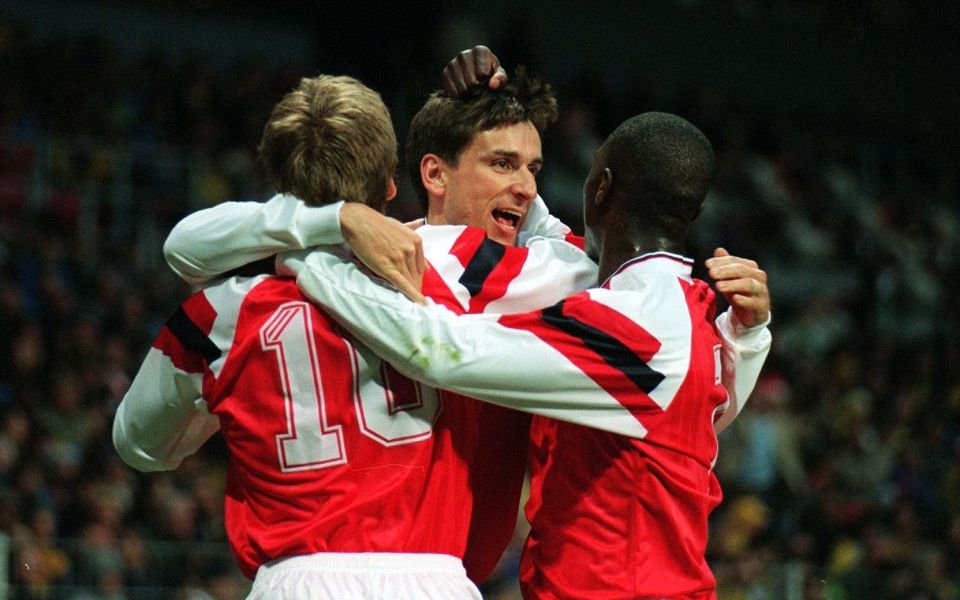Up front: Former Arsenal and England star Alan Smith reveals uncomfortable relationship with Ian Wright in his new book

Footballers have many habits that set people’s eyes rolling.
One is their penchant for releasing ghost-written autobiographies at exceptionally young ages. Wayne Rooney’s “story”, for example, was first published when he was 20 years old.
Alan Smith, however, was never the typical footballer, right back to his teenage years when he insisted on taking A-levels and even starting a degree – pursuits viewed at the time as a bizarre distraction for a young man trying to land a professional contract.
Thus it seems appropriate that Smudge, as he is affectionately known by fans and colleagues, has waited until he is 55 before publishing Heads Up, an honest reflection on his life and career in football and, subsequently, journalism.
The former Daily Telegraph and current Evening Standard columnist says he sat down a year ago and began to write the book, alone.
“I’m pleased that I have been able to do it myself, and I think that it does give it a slightly more authentic feel,” Smith tells City A.M.
“I wanted to continue writing and I just thought that it was the right time because I've been out of the game for 20 odd years… and I felt that I was in a good position to look back on my career, to take a view of it from a distance. As you get older you're prepared to be a bit more forthright, a bit more honest.”
A level-headed and reserved character during his playing days – famously receiving only one yellow card throughout his entire career – Smith admits to being too quiet in the past, something he identifies as a personality flaw. Writing this book, he says, became an almost therapeutic exercise in opening up.
“Everybody has episodes in their life that maybe they’ve bottled up a bit,” he says. “If you’re going to write a book, I think you’ve got to be as open as you can be.”
Intriguingly for Arsenal fans, this approach leads to a revelation about Smith’s “uncomfortable” relationship with star striker Ian Wright, whose arrival at Highbury coincided with a decline in his fellow-centre-forward’s form.
“My relationship with Ian Wright, that was something that I’ve never really spoken to Ian about. But to get it down the page it was quite cathartic,” he says.
“I certainly wasn’t enjoying the football at the time. Wrighty came in, and he did more than anybody thought he would do, he became the club’s top goal scorer and he’s rightfully a legend. In life sometimes things don’t happen like you'd thought they would. I thought we’d make a great partnership, and we didn’t really.
“I have had a chat with Ian [about the book] and and he appreciated it. He didn’t say too much. He was very good about it.”
Smith’s book includes reflections on Arsenal’s 1990-91 title win, in which he finished the division’s top scorer with 22 goals. Despite losing only one game fewer, that Gunners team has enjoyed nothing like the reverence afforded Arsene Wenger’s unbeaten class of 2003-04.
“Maybe so. Just that one game against Chelsea prevented us. We had a bit of bad luck that day as well with injuries and we had a makeshift rearguard so it might have been so different,” he says.
“But listen, that’s life. Obviously the Invincibles side was a different sort of team. I never really thought I'd be in a team that only lost a game during one season, so to look back at that campaign for my book, it was a pleasure.”
Such achievements feel a long way away now for Arsenal, who have made a mixed start to life in the post-Wenger era under new manager Unai Emery. Smith has been encouraged by the Spaniard’s emphasis on teamwork, however.
“There are positive signs, definitely, like Mesut Ozil being substituted if he’s not playing well. You could not imagine that happening under Arsene Wenger,” he says.
“I think it's that accountability – if you’re not doing a job for the team, you won’t be in that team. And that lack of accountability is something that cast a shadow over Arsene’s final few years. Too many people got away with too much.”
Change is in the air at Emirates Stadium, with majority shareholder Stan Kroenke set to become sole owner. Smith is equivocal as usual yet concerned that the American multi-sport franchise owner will prioritise financial performance over league position.
“The fact that he owns it outright isn't necessarily a bad thing,” he says. “The worrying aspect is his track record in America with his sports clubs and not many have done terribly well. It almost seems to me, from the outside, that if they are making money he is happy.
“It was glaringly obvious that once we saw empty seats at the Emirates [last season] and they weren't in the Champions League, Kroenke was persuaded that a change of manager was due – and not before that.”